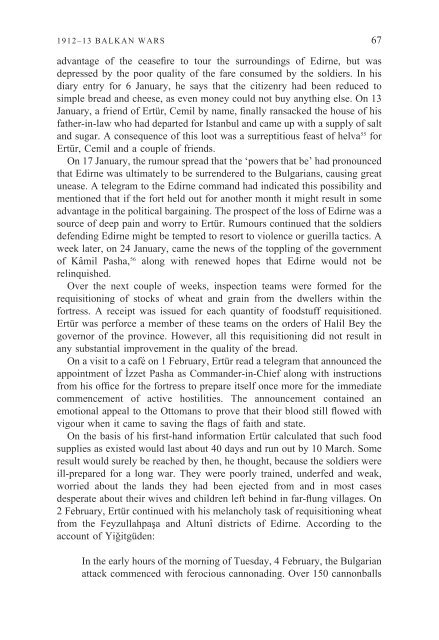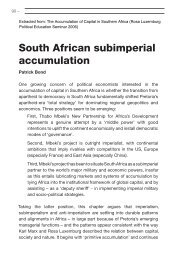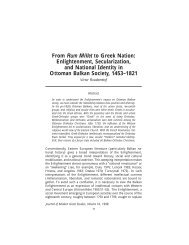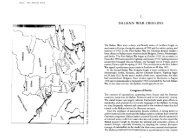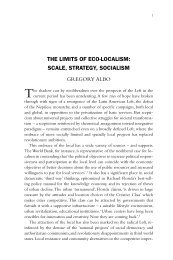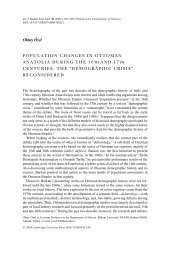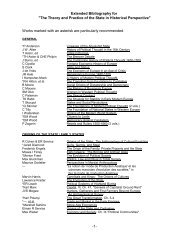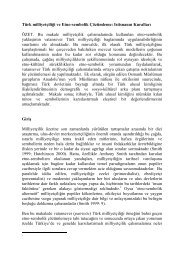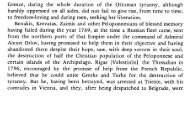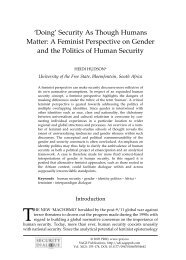Wasti, S. T. "The 1912-13 Balkan Wars and the Siege of Edirne"
Wasti, S. T. "The 1912-13 Balkan Wars and the Siege of Edirne"
Wasti, S. T. "The 1912-13 Balkan Wars and the Siege of Edirne"
Create successful ePaper yourself
Turn your PDF publications into a flip-book with our unique Google optimized e-Paper software.
<strong>1912</strong>–<strong>13</strong> BALKAN WARS 67advantage <strong>of</strong> <strong>the</strong> ceasefire to tour <strong>the</strong> surroundings <strong>of</strong> Edirne, but wasdepressed by <strong>the</strong> poor quality <strong>of</strong> <strong>the</strong> fare consumed by <strong>the</strong> soldiers. In hisdiary entry for 6 January, he says that <strong>the</strong> citizenry had been reduced tosimple bread <strong>and</strong> cheese, as even money could not buy anything else. On <strong>13</strong>January, a friend <strong>of</strong> Ertür, Cemil by name, finally ransacked <strong>the</strong> house <strong>of</strong> hisfa<strong>the</strong>r-in-law who had departed for Istanbul <strong>and</strong> came up with a supply <strong>of</strong> salt<strong>and</strong> sugar. A consequence <strong>of</strong> this loot was a surreptitious feast <strong>of</strong> helva 55 forErtür, Cemil <strong>and</strong> a couple <strong>of</strong> friends.On 17 January, <strong>the</strong> rumour spread that <strong>the</strong> ‘powers that be’ had pronouncedthat Edirne was ultimately to be surrendered to <strong>the</strong> Bulgarians, causing greatunease. A telegram to <strong>the</strong> Edirne comm<strong>and</strong> had indicated this possibility <strong>and</strong>mentioned that if <strong>the</strong> fort held out for ano<strong>the</strong>r month it might result in someadvantage in <strong>the</strong> political bargaining. <strong>The</strong> prospect <strong>of</strong> <strong>the</strong> loss <strong>of</strong> Edirne was asource <strong>of</strong> deep pain <strong>and</strong> worry to Ertür. Rumours continued that <strong>the</strong> soldiersdefending Edirne might be tempted to resort to violence or guerilla tactics. Aweek later, on 24 January, came <strong>the</strong> news <strong>of</strong> <strong>the</strong> toppling <strong>of</strong> <strong>the</strong> government<strong>of</strong> Kâmil Pasha, 56 along with renewed hopes that Edirne would not berelinquished.Over <strong>the</strong> next couple <strong>of</strong> weeks, inspection teams were formed for <strong>the</strong>requisitioning <strong>of</strong> stocks <strong>of</strong> wheat <strong>and</strong> grain from <strong>the</strong> dwellers within <strong>the</strong>fortress. A receipt was issued for each quantity <strong>of</strong> foodstuff requisitioned.Ertür was perforce a member <strong>of</strong> <strong>the</strong>se teams on <strong>the</strong> orders <strong>of</strong> Halil Bey <strong>the</strong>governor <strong>of</strong> <strong>the</strong> province. However, all this requisitioning did not result inany substantial improvement in <strong>the</strong> quality <strong>of</strong> <strong>the</strong> bread.On a visit to a café on 1 February, Ertür read a telegram that announced <strong>the</strong>appointment <strong>of</strong> İzzet Pasha as Comm<strong>and</strong>er-in-Chief along with instructionsfrom his <strong>of</strong>fice for <strong>the</strong> fortress to prepare itself once more for <strong>the</strong> immediatecommencement <strong>of</strong> active hostilities. <strong>The</strong> announcement contained anemotional appeal to <strong>the</strong> Ottomans to prove that <strong>the</strong>ir blood still flowed withvigour when it came to saving <strong>the</strong> flags <strong>of</strong> faith <strong>and</strong> state.On <strong>the</strong> basis <strong>of</strong> his first-h<strong>and</strong> information Ertür calculated that such foodsupplies as existed would last about 40 days <strong>and</strong> run out by 10 March. Someresult would surely be reached by <strong>the</strong>n, he thought, because <strong>the</strong> soldiers wereill-prepared for a long war. <strong>The</strong>y were poorly trained, underfed <strong>and</strong> weak,worried about <strong>the</strong> l<strong>and</strong>s <strong>the</strong>y had been ejected from <strong>and</strong> in most casesdesperate about <strong>the</strong>ir wives <strong>and</strong> children left behind in far-flung villages. On2 February, Ertür continued with his melancholy task <strong>of</strong> requisitioning wheatfrom <strong>the</strong> Feyzullahpaşa <strong>and</strong> Altunî districts <strong>of</strong> Edirne. According to <strong>the</strong>account <strong>of</strong> Yiğitgüden:In <strong>the</strong> early hours <strong>of</strong> <strong>the</strong> morning <strong>of</strong> Tuesday, 4 February, <strong>the</strong> Bulgarianattack commenced with ferocious cannonading. Over 150 cannonballs


